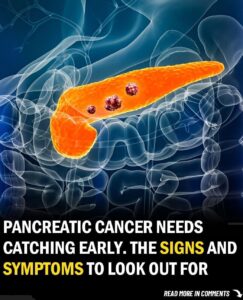10 Warning Signs of Pancreatic Cancer You Shouldn’t Overlook

Pancreatic cancer is one of the most aggressive and deadly cancers, primarily because it’s typically discovered too late. Its symptoms often remain hidden or are mistaken for other health issues, making early detection difficult. Recognizing early indicators can be the key to improving survival chances through timely treatment. Here are ten important symptoms that could signal pancreatic cancer—and why it’s critical not to ignore them.
What Is Pancreatic Cancer?
The pancreas is a vital organ situated behind the stomach that aids digestion and helps regulate blood sugar through insulin and hormone production. When abnormal cells start multiplying uncontrollably in the pancreas, they can form a tumor. The most common form is pancreatic ductal adenocarcinoma, which accounts for nearly 95% of all cases. Less frequent types include neuroendocrine tumors, which tend to grow more slowly, and cystic tumors, which may begin as noncancerous but carry cancer risk over time.
10 Common Symptoms of Pancreatic Cancer
Due to its subtle onset, pancreatic cancer often progresses before it shows any noticeable effects. These ten signs could be early indicators of a problem and should prompt medical attention:
1. Sudden, Unexplained Weight Loss
If you’re losing weight without trying—especially if it’s paired with a loss of appetite—it may be a red flag. This could signal that your body isn’t processing nutrients properly, possibly due to a pancreatic tumor.
2. Jaundice (Yellowing of Skin or Eyes)
A noticeable yellow tint to your skin or eyes may be caused by a blocked bile duct, which can occur if a tumor presses against it. This can lead to a buildup of bilirubin, a substance produced by the liver.
3. Persistent Abdominal Pain
Discomfort or a dull ache in the upper abdomen, sometimes radiating to the back, is a symptom many patients report. This pain may intensify after eating or while lying down.
4. Digestive Disruption
Pancreatic cancer can interfere with your body’s ability to break down food, resulting in symptoms like bloating, indigestion, or chronic diarrhea. Stools may appear oily or unusually foul-smelling.
5. New or Worsening Diabetes
If you’ve never had blood sugar issues but are suddenly diagnosed with diabetes, it may be more than coincidence. Tumors can impair the pancreas’s ability to regulate insulin.
6. Changes in Bowel Movements
Watch out for pale, greasy, or floating stools—these can be signs that your pancreas isn’t releasing enough digestive enzymes.
7. Extreme Tiredness
Fatigue that lingers, even after rest, is a common but often overlooked cancer symptom. It may be linked to anemia, inflammation, or the cancer itself draining your energy.
8. Ongoing Back Pain
Some patients experience persistent pain in the middle or lower back. This may happen if the cancer spreads to surrounding tissues or nerves.
9. Blood Clots
Swelling, warmth, or redness in the arms or legs may indicate a blood clot. Pancreatic cancer can increase your body’s tendency to form clots unexpectedly.
10. Nausea or Vomiting After Eating
Feeling full quickly, queasy, or vomiting shortly after meals could mean a tumor is pressing against your stomach or small intestine.
When to Talk to a Doctor
If you’re experiencing any combination of these symptoms—especially over a prolonged period—it’s essential to speak with a healthcare professional. They can perform diagnostic tests such as blood work, imaging scans, or biopsies to determine if your pancreas is functioning properly.
Reducing Your Risk: Prevention & Awareness
While there’s no guaranteed way to prevent pancreatic cancer, lifestyle changes can help lower your risk:
-
Quit smoking: Smoking is a top risk factor.
-
Maintain a healthy weight: Obesity increases the risk significantly.
-
Limit alcohol: Excessive drinking damages the pancreas.
-
Eat a balanced diet: Focus on fruits, vegetables, and whole grains.
-
Exercise regularly: Physical activity improves overall health.
Who’s Most at Risk?
Several factors raise the likelihood of developing pancreatic cancer:
-
Age: Risk rises sharply after age 60.
-
Family history: A genetic predisposition can increase risk, especially if close relatives were affected.
-
Diabetes: Especially if newly diagnosed in adulthood.
-
Ethnic background: African Americans and Ashkenazi Jews have slightly higher rates.
-
Chemical exposure: Workers exposed to certain industrial chemicals may face elevated risks.
-
Gender: Men have a slightly higher incidence rate.
Final Thoughts
Pancreatic cancer may be one of the most difficult cancers to detect early, but that makes awareness even more critical. Knowing what to watch for and seeking medical advice without delay can be life-saving. If you or someone you know is experiencing these symptoms, don’t wait—talk to a doctor today.